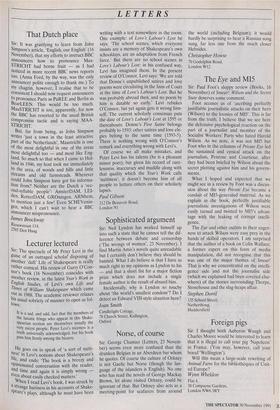Lecturer lectured
Sir: The spectacle of Mr Peter Levi in the guise of an outraged scholai disposing of another 'daft' Life of Shakespeare is really rather comical. His review of Garry O'Con- nor's book (16 November) coincides with another review, in the latest Year's Work in English Studies, of Levi's own Life and Times of William Shakespeare which came out in 1988. The academic reviewer relaxes his usual sobriety of manner to open as fol- lows: It is a sad, and odd, fact that the members of the lunatic fringe who appear in this Shake- spearian section are themselves usually the very nicest people. Peter Levi's niceness is a truth universally acknowledged, but his book puts him firmly among the bizarre.
He goes on to speak of 'a sort of nutti- ness' in Levi's notions about Shakespeare's life, and ends: The book is a breezy and opinionated conversation with the reader, and time and again it is simply wrong — even about easily checked matters.' When I read Levi's book, I was struck by a strange haziness in his accounts of Shake-* sPeare's plays, although he must have been
writing with a text somewhere in the room. One example: of Love's Labour's Lost he says: 'The school scenes, which everyone insists are a memory of Shakespeare's own schooldays, are an adaptation from French farce.' But there are no school scenes in Love's Labour's Lost: in his confused way, Levi has imagined them. In the present review of O'Connor, Levi says: 'We are told that Donne's unpublished satires and love poems were circulating in the Inns of Court at the time of Love's Labour's Lost. But he was probably abroad then, and no poem by him is datable so early.' Levi rebukes O'Connor, but yet again gets it wrong him- self. The current scholarly consensus puts the date of Love's Labour's Lost at 1595 or thereabouts; Donne's First Satire belongs probably to 1593: other satires and love ele- gies belong to the same time (1593-5). There is nothing wrong with O'Connor's remark and everything wrong with Levi's.
Of course we all make mistakes, and Peter Levi has his talents (he is a pleasant minor poet); but given his record of care- lessness, inaccuracy and muddle along with that quality which the Year's Work calls `nuttiness', it doesn't become him of all people to lecture others on their scholarly lapses.
Paul Gibson
212 De Beauvoir Road, London NI










































































 Previous page
Previous page